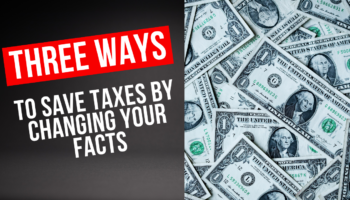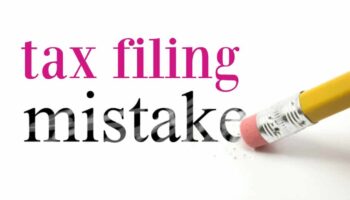Whether you like it or not, taxes affect all of us. In fact, it is probably the biggest household expense (assuming you have a decent job or business), yet most people do nothing to manage their taxes. Here are top 10 reasons why you may be paying too much in taxes:
- Lack of periodic tax plan: This is a big one. Most people will only discuss taxes once a year during tax filing season. That’s a bad idea. Planning is critical for both individuals and businesses to ensure that you’re optimizing your taxes. Tax laws change from time to time and planning ensures you’re on top of these changes and positioned to take advantage of the changes as they occur. If you are an individual with assets, you have to plan to ensure assets are transferred to your spouse or kids on a tax-efficient way as lack of planning can result in the payment of significant taxes on death. On death all your assets are deemed to be disposed at fair market value and taxed at your top marginal tax rate. If you own a business, succession planning is critical as there are significant tax implications if you’re considering selling or transferring ownership of your business.
- T4 Employment income is your only source of income: If T4 employment income is your only source of income, you have minimal opportunity to manage the taxes you pay. It’s even worse if you’re a high income earner (i.e. you gross over $100,000 per annum) as you will be in the high end of the income tax bracket. The high tax rates on employment income in Canada is one of the major reasons the average middle class person finds it challenging to save or get ahead in this economy. Another reason is that the average employee pays for expenses using after tax dollars with additional sales tax on these expenses. So if you’re employed with high income you have to be creative and to deliberately plan on how to convert your employment income to other sources of income that are taxed at far better rates. Strategies may include starting a side business, investing in real estate and creating opportunities to income split with other family members.
- You never review your tax returns for opportunities to save on taxes: It is common to file your tax return and never review it for opportunities to save in subsequent years. How many times have you sat down with your tax advisor to discuss how to improve your tax position? How many times have you reviewed each line on your tax return to understand the nature of income reported, tax rate applicable to the income, what your average tax rate is, how much you actually paid in taxes, tax deductions or credits that were applied to your income, etc? If you don’t take the time to review, you will miss opportunities and likely end up paying more than your fair share of taxes in subsequent years.
- Lack of optimization with family members: It is surprising how many people file their taxes independent of your spouse and other family members. As a result, opportunities to split income and subsequently reduce taxes are missed.
- You don’t take advantage of the tax breaks from TFSA and RRSP Contributions: Whether you like it or not, whether you agree or disagree, TFSAs and RRSPs provide tax benefits! For RRSPs, taxes deferred to future years puts cash in your pocket today that can be invested, spent or put to other uses. There are so many misconceptions out there about RRSPs. One that I hear from time to time is that the government has control of your money. This is not true! You have total control of your RRSP investments if you self direct it or manage it yourself in a brokerage account. Others simply refuse to contribute to RRSPs because they say you will pay taxes when you withdraw from the RRSP. Yes, you will. However, will you rather pay the taxes today or in the distant future? For TFSAs, you contribute with after-tax dollars but the income and growth in the account is tax-free. You certainly want to maximize your RRSP and TFSA contribution room before investing in non-Registered accounts to save on taxes.
- You’re either single or you act like you are: Unfortunately, if you’re single, the Canadian tax law is not your best friend. Our tax system is more favorable to families as there are more opportunities to share credits and income split. Despite the benefits of filing taxes as a family, I still find married individuals who act like they’re single as they file alone, thus missing out of the benefits and tax savings of filing together as a family.
- You file your taxes yourself: There is nothing wrong with filing your taxes yourself with the number of relatively cheap or free tax software programs out there. If you have a simple tax situation with only employment income and nothing else, you will likely be fine. If on the other hand, your tax return is a little complicated with family, investment income, business income or rental income, you will certainly need the help of a professional if you’re not a tax professional yourself. Filing your taxes yourself with limited knowledge is certainly a recipe for missing credits and deductions and paying more in taxes.
- You don’t have a competent Tax Advisor: Whether you file your taxes yourself or not, it is important to have a professional Tax Advisor that can give you a competent opinion and advice on your situation. Professional Tax Advisors are held to a higher standard, belong to a regulated professional body that requires minimum educational qualification and ongoing professional development, undergo periodic review of their practice and are required to hold the public interest in high regard.
- You lack basic knowledge of taxes: Ultimately, you are responsible for information reported on your tax return, not the tax preparer! At the end of the day, you have to sign and authorize the tax preparer to file your tax return. By doing so, you’re telling the Government (CRA) that you have reviewed your tax return and you are comfortable that all information reported is accurate. To do this correctly, you must have some basic knowledge of tax, without which you cannot complete a reasonable review of your tax returns. Getting basic knowledge of taxes is particularly more important if you’re not engaging a reputable professional to prepare your tax returns.
- You never negotiate the structure of your compensation: Given that various types of income attract different tax rates and certain employment benefits are tax-free, there are opportunities to negotiate your compensation to minimize your taxes. If you are a full-time employee, you can take advantage of these opportunities when negotiating with your current or future employer and if you’re a contractor, you can also negotiate and structure how you want to be paid for maximum tax benefits.






